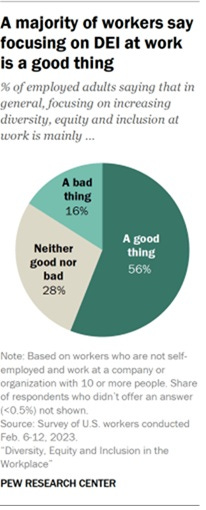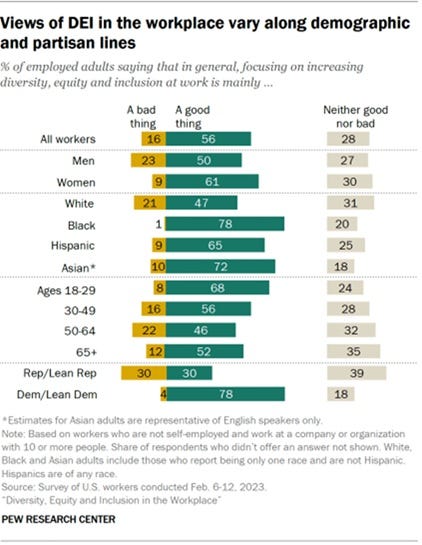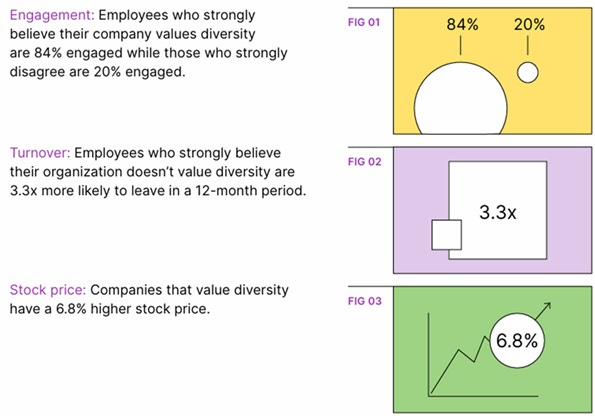Corporate DEI at a crossroads: adapt, resist, or retreat?
Trump’s opposition to DEI is reshaping policies. How will this impact workplaces globally? Should businesses scale back or strengthen DEI efforts?
Known for his vocal opposition to diversity, equity, and inclusion (DEI) initiatives during his first term and afterward, Trump wasted no time acting on his campaign promises to reshape national policies. While the value of DEI is undeniable, this article explores recent developments and examines whether businesses should reconsider or reinforce their DEI initiatives in response to current political trends.
What is DEI?
DEI stands for diversity, equity, and inclusion, a concept based on the principle that all individuals should have equal rights, treatment, and opportunities tailored to their needs, regardless of race, gender, sexual orientation, ethnicity, national origin, religion, or factors. Its goal is to eliminate discrimination in all forms. DEI isn’t just about advocating for LGBTQ+ rights or promoting women to senior positions; it also involves creating accessible workplaces for neurodiverse individuals and ensuring facilities cater to those with disabilities.
Although these principles may seem self-evident today, structural racism, unconscious bias, and systemic inequalities create significant barriers to fostering environments where everyone feels safe, valued, and equally treated. These challenges are particularly acute in large organisations with employees from diverse cultural and linguistic backgrounds. To address these issues and meet growing employee expectations, many companies have established dedicated DEI teams that integrate these principles into daily operations and organisational policies, fostering inclusivity and equity in the workplace.
Reactions to DEI initiatives vary. Those aligned with the political left often support such efforts, while those on the right may view them as excessive. Some believe more must be done to support underrepresented groups, while others argue that these initiatives go too far. Those in traditionally privileged positions sometimes perceive these changes as a threat to their status. Critics argue that certain DEI policies enforce quotas rather than merit-based hiring or that some initiatives may have legal or divisive implications.
Donald Trump has consistently aligned himself with groups sceptical of DEI, making his opposition to such measures clear.
What Trump Promised
During his first term, Trump took a strong stance against DEI initiatives. In 2020, he issued an executive order prohibiting federal agencies from conducting DEI training for government employees, which sparked backlash from civil rights groups. His administration also implemented policies marginalising transgender individuals, including a military service ban, and sought to roll back LGBTQ+ protections. Additionally, he introduced a travel ban targeting predominantly Muslim countries. While some of these measures were blocked by the courts, the administration’s intent to target DEI initiatives was evident.
During his second campaign, Trump doubled down on these positions, further reinforcing his stance against DEI. He introduced new policies in his 2023 GOP Presidential Election Programme, “Make America Great Again.” His agenda aimed to cut federal funding for schools teaching critical race theory, gender-related topics, and other so-called “left-wing propaganda.” He also pushed for strict gender divisions in sports, banning transgender athletes from competing in categories aligned with their gender identity. His broader vision encouraged private organisations to abandon DEI initiatives and adopt “anti-woke” practices, often reinforcing existing inequalities under the guise of protecting American traditions.
What Trump Has Done So Far
Early in his second term, Trump moved swiftly to dismantle diversity initiatives. He halted all federal DEI programmes, placed DEI-related staff on paid leave, and rescinded contracts with DEI service providers. Key executive orders promoting equal opportunity, including Executive Order 11246 (signed by Lyndon B. Johnson in 1965), were revoked.
His administration also reinstated bans on transgender military service and rejected the use of gender-affirming pronouns. Federal agencies are now in limbo, as executive orders outline a clear anti-DEI stance, but lack detailed guidance. The first visible changes include the removal of DEI-related materials from federal websites, which have been replaced by "Error 404" messages. While some legal protections remain, Trump’s actions have signalled a clear shift, impacting both federal and corporate environments.
Not all of his policies may be fully enacted, as some are likely to face legal challenges, just as they did in his previous term. However, the question remains: will his actions against DEI stop here, or is there more to come? And how will private organisations respond?
How This May Affect Private Organisations
So far, Trump’s executive orders apply only to federal agencies, not private companies. However, he has asked U.S. Attorney General Pam Bondi to explore ways to extend his anti-DEI agenda to the private sector.
Some large corporations, such as Walmart, Boeing, Lowe’s, Ford, Amazon, and McDonald’s, began scaling back their diversity programmes even before Trump officially took office for a second term. This trend is likely to continue. Of course, companies may scale back or take down their DEI practices due to concerns over the cost and complexity of implementing such initiatives, a belief that these practices are not yielding immediate business results, or a desire to align with leadership or shareholder views that prioritise other strategic goals. While it doesn’t necessarily have to be about Trump, companies such as Costco and e.l.f. have reaffirmed their commitment to DEI, a stance echoed by certain labour organisations.
Although these developments primarily concern the U.S., their effects may ripple through global branches of multinational corporations, either by loosening DEI policies, reducing funding, or, in extreme cases, completely dismantling established DEI frameworks.
Where Should Businesses Stand?
If securing favour with Trump and the GOP is a priority, rolling back DEI initiatives may seem like a safe move. But is it?
Even for companies uncertain about the benefits of DEI, legal protections remain in place. Anti-discrimination laws in various countries prohibit bias based on race, religion, gender, or disability. The U.S. Civil Rights Act (1964), Americans with Disabilities Act (1990), and Equal Pay Act (1963) provide strong legal safeguards, while similar protections exist in the UK, EU, Canada, Australia, and many other countries.
Public opinion also leans in favour of DEI. A 2023 Pew Research Centre survey found that 56% of employed Americans viewed increasing DEI efforts positively, with only 16% opposing them. Support was highest among underrepresented groups, including non-white workers and women. Culture Amp’s 2023 Global DEI & Employee Experience Survey found that 60% of employees were satisfied with workplace DEI efforts, though many called for greater action.

From a business perspective, DEI fosters innovation, improves critical thinking, and enhances problem-solving. A diverse workforce attracts top talent, particularly from underrepresented groups who prefer inclusive workplaces. McKinsey’s 2019 analysis found that companies in the top quartile for gender diversity in executive teams were 25% more likely to experience above-average profitability. Ethnic diversity had an even greater impact, with top-quartile companies outperforming others by 36% in profitability.

Culture Amp also found a strong link between poor DEI practices and higher turnover rates. Employees who feel that their company does not value diversity are over three times more likely to leave within a year. Additionally, businesses that prioritise diversity tend to experience nearly 7% higher stock prices.

From a political perspective, following Trump’s lead may seem advantageous to some businesses. However, for companies focused on long-term performance and competitiveness, maintaining and even strengthening DEI efforts is the smarter choice.
While legal requirements vary, the business case for DEI remains strong. The key question for organisations is whether they will continue to support inclusivity or regress in response to political pressures. From both an ethical and strategic standpoint, the choice is clear.
Sources used to write this article:
1. What is diversity, equity, and inclusion (DE&I)? | McKinsey
2. https://dictionary.cambridge.org/dictionary/english/dei
3. What Is Diversity, Equity & Inclusion (DEI)?
4.Executive Order on Combating Race and Sex Stereotyping – The White House
5. The Trump Administration’s Transgender Military Ban - American Oversight
6. Trump to roll back protections for transgender people and end government DEI programs | AP News
10. Trump's second-term agenda: deportations, trade wars, cutting corporate tax rate | Reuters
11. What Is DEI and How Is Donald Trump Challenging It? | TIME
12. Ending Radical And Wasteful Government DEI Programs And Preferencing – The White House
14. Trump campaign against diversity urges government employees to turn informer | Reuters
16. U.S. Department of Education Takes Action to Eliminate DEI | U.S. Department of Education
17. Trump takes aim at DEI, COVID expulsions and transgender troops | Reuters
19. Trump Administration Targets DEI Initiatives With New Orders
20. Executive Order 11246, As Amended | U.S. Department of Labor
21. Restoring America's Fighting Force – The White House
22. Page Not Found
23. Diversity, Equity and Inclusion in the Workplace: A Survey Report (2023) | Pew Research Center
24. Court Overturns President Trump’s Ban On Federal Contractor Diversity Training | Fisher Phillips
26. Amazon removes commitment to transgender and Black rights from policies - The Washington Post
27. Our Commitment to Inclusion at McDonald’s
29. Trump Abandons Six Decades of Progress on Workplace
32. Diversity, Equity and Inclusion in the Workplace: A Survey Report (2023) | Pew Research Center
33. Why diversity matters | McKinsey
34. Delivering growth through diversity in the workplace | McKinsey
36. Workplace Diversity, Equity, and Inclusion 2024 Report
38. The Power Of Diversity And Inclusion: Driving Innovation And Success



